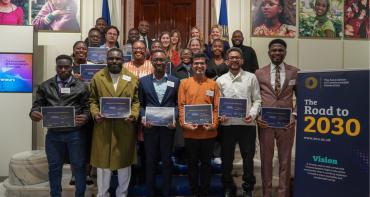Tackling preventable diseases, funding universal healthcare and guaranteeing cervical cancer screening for girls are among the topics that will be addressed by Commonwealth ministers at a major health summit.

Tackling preventable diseases, funding universal healthcare and guaranteeing cervical cancer screening for girls are among the topics that will be addressed by Commonwealth ministers at a major health summit.
Creating one-stop crisis centres for the victims of gender-based violence will also be on the agenda at the annual Commonwealth Health Ministers Meeting (CHMM), which takes place this Sunday in Geneva. The CHMM findings will feed into the World Health Assembly, the decision-making body of the World Health Organization, whose 71st meeting runs from 20-26 May in Switzerland.
Ministers from Commonwealth countries will agree on a range of measures to address debilitating lifestyle diseases and the strategic measures that are necessary to overcome them. They will also support pooled procurement of high-cost essential medicines and a more targeted approach to financing vaccines and health technologies.
Keynote speakers include the co-founder of The Elders and universal healthcare champion, Graça Machel, and the World Health Organization’s Director-General, Tedros Adhanom. The meeting will be chaired by Rosy Akbar, Minister for Health and Medical Services in Fiji.
Mbololwa Mbikusita-Lewanika, health adviser at the Commonwealth Secretariat, said, “This year’s meeting comes at a seminal moment for Commonwealth countries. We have a real opportunity to work collaboratively and creatively to address some of the of the biggest health challenges facing citizens from across the 53 member states.
“Non-communicable diseases (NCDs) kill millions of people across the Commonwealth each year. That is completely unacceptable in 2018. That’s why we’re setting out bold proposals for governments to consider which, if agreed upon, could be game-changers for many Commonwealth countries, especially the Small Island Developing States and low-and middle-income countries that are disproportionately affected and merit special attention.”
The theme of this year’s meeting is 'Enhancing the global fight against NCDs: raising awareness, mobilising resources and ensuring accessibility to universal health coverage’.
The main areas set to be discussed are:
Non-communicable diseases
- Use existing model legislation to create 100% smoke free public spaces.
- Raise taxes on tobacco products to 75% of purchase price and implement graphic warnings or plain packaging.
- Implement a 20% tax on sugar-sweetened beverages in Commonwealth countries.
Commonwealth collaboration and collective action
- Ensure that by 2025 all girls in the Commonwealth between 9-13 years of age will have a human papilloma virus (HPV) vaccination.
- Support a fair price for HPV vaccines, particularly in the nine Commonwealth small states that do not have HPV vaccination programmes.
- Establish a Commonwealth Evidence Base for Cancer Control that will provide faster access to research into cancer.
- Share pricing information through the creation of a Commonwealth database on the prices of essential medicines, vaccines and health technologies.
- Assess and review procurement legislation, medicine regulation and registration, with a view to harmonisation.
Sustainable financing of Universal Health Coverage
- Engage political leaders, including Ministers of Finance, to promote universal health coverage.
- Develop national health financing plans that determine how resources will be raised, pooled and distributed.
- Identify opportunities for improved spending on health through fiscal space analysis, service input gap analysis and resource tracking.
- Strengthen coordination of external financing at national and international levels.
- Strengthen coordination between domestic resource mobilisation (DRM), development assistance for health (DAH) and broader overseas development assistance (ODA) to ensure synergy and catalytic effect of DAH on DRM.
- Introduce a Country Financing Facility for health, in light of the success of Financing Facility for Immunisation.
Health facility-based coordinated response to gender-based violence (GBV)
- Harmonise the multi-sector programs led by the health sector to end GBV.
- Establish health sector initiatives, particularly one-stop centres to implement GBV programs within the UHC framework.
- Set objectives, targets, milestones and time frames to end GBV and implement evidence-based interventions to combat it.



